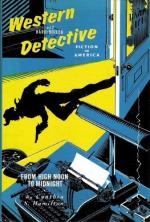|
This section contains 901 words (approx. 4 pages at 300 words per page) |

|
Hard-boiled detective fiction is often defined in terms of what it is not. It is not set in an English village; the solution is not reached by analyzing clues. To paraphrase Raymond Chandler, one of its most famous writers, it is not about dukes and Venetian vases, or handwrought duelling pistols or curare or tropical fish. Hard-boiled detective fiction emerged in 1920s America as an antidote to such things. It exploits familiar urban and industrial settings; its heroes, and now heroines, are ordinary people, working alone.
Hard-boiled detective fiction can be recognized by four main elements: the language, the setting, the detective, and the detection. The first of these is what links hard-boiled detective fiction with other literature of the period. Hard-boiled language describes things rather than ideas: adjectives are kept to a minimum; it reports what happened and what was said, not how...
|
This section contains 901 words (approx. 4 pages at 300 words per page) |

|


